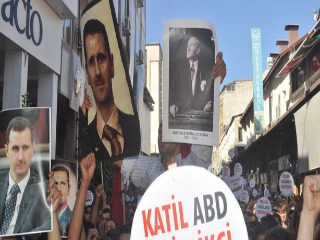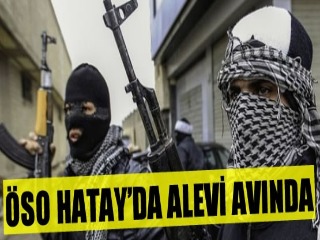BACKGROUND: When the uprising against the regime of President Bashar al-Assad in Syria began in 2011, the Turkish government, which had enjoyed close relations with al-Assad, initially attempted to use its influence to moderate the response of the Baath regime to the uprising. Turkey’s foreign minister Ahmet Davutoğlu made several calls to Damascus, reportedly urging President al-Assad to find ways to accommodate the protesters. When it became clear that the Syrian regime had no intention to heed the advice of its friends in Ankara, Turkey reversed course; Turkish Prime Minister Recep Tayyip Erdoğan, who reportedly felt personally insulted by the refusal of al-Assad to follow recommendations, took his hands from his former friend and called for his resignation. From that point on, in September 2011, Turkey became one of the main sponsors of the Sunni rebellion. The Muslim Brotherhood-dominated Sunni rebel movement was allowed to set up headquarters in Istanbul, Turkey supplied critical logistical support to the rebels, and has called for a military intervention in support of their cause.
The Turkish government did not hide its disappointment when the United States and Russia reached a deal to disarm the chemical weapons of Syria. In an interview with the Washington Post on September 24, Turkey’s president Abdullah Gül reiterated the official Turkish position. Gül said that he does not see the U.S.-Russia framework agreement as a solution to the Syria crisis and that Syrian president Bashar al-Assad must go. “The discussion on Syria should not be reduced only to a discussion of chemical weapons,” Gül stated. In an interview on the website of Foreign Affairs on September 24, the Turkish president said that “the chemical weapons issue should not distract us from the bigger concerns we all have about Syria. There has to be a very strong, decisive political strategy in order to stop what is going on there.”
Commenting that the agreement leaves al-Assad in power, Gül said in the interview in the Washington Post “that’s not something we can live with.” “If we leave things on their own, there is a danger that what is happening in Afghanistan will happen on the shores of the Mediterranean, and no one can tolerate that,” he made clear.
The statements of the Turkish president reflect the growing apprehension that the civil war in Syria is going to have – indeed already has – effects that spill over into Turkish territory. The influx of five hundred thousand refugees has already destabilized the border region of Turkey, most notably the Hatay province, where the massive influx of Sunni refugees has put the sizeable Arab Alawite population in the province on edge.
But the risks for Turkey are not confined to the border region. The Syrian civil war, and more precisely Turkey’s adoption of the Sunni cause there, has created anger among the minority Alevis in Turkey.(See 11 September 2013 Turkey Analyst) The Alevis do not share the same creed as the Alawites in Syria, but they have nonetheless become unsettled by the support that the Turkish government has lent to the Sunni rebels; from an Alevi perspective, this is yet another expression of the traditional Sunni hostility toward what is seen as “heretics”. If Turkey persists in supporting the Sunni rebels, the sectarian fault line in the country that divides Sunnis and Alevis will continue to widen dangerously.
The Turkish government also risks alienating its Kurdish population. Turkey has made clear that it will not tolerate the attempt of the Kurds in Syria to establish self-rule; and it has put force behind those words. Jihadist rebels, foremost among them the Jabhat al-Nusra which has pledged allegiance to al-Qaeda, have continued to battle the Kurdish forces in northeastern Syria, just across the border to Turkey, since the end of 2012. Turkey has denied the charges that it has been supporting these rebels; these assurances notwithstanding, it is clear that the jihadist militants are allowed free passage to and from Turkey and that they would not have been able to carry out their attacks against the Kurds without the Turkish authorities turning a blind eye to them.(See 30 May 2013 Turkey Analyst) Until recently, the Turkish government has also declined to depict Jabhat al-Nusra as a terrorist organization, which the United States does.

IMPLICATIONS: Turkish government may not yet be ready to fully reexamine its Syria policy and to acknowledge that Turkey bears a share of the responsibility for the present state of affairs in Syria. Turkey has been far from a passive bystander to the civil war in Syria. The authors of Ankara’s Syria policy are Prime Minister Erdoğan and foreign minister Davutoğlu, while President Gül has on occasion hinted that Turkey’s latest forays into the Middle East are fraught with risks.
But the nuances that exist between Gül on the one hand and Erdoğan and Davutoğlu on the other hand were not on full display in the interviews that the Turkish president accorded to U.S. media during his visit this week to the UN General Assembly. Told by the Washington Post that there is a perception in the United States that the Syrian opposition is dominated by extremists, and that Turkey, together with Qatar, is blamed for channeling arms to extremist groups like Jabhat al-Nusra, President Gül had in fact no choice but to forcefully deny the charge. “These extremists don’t come to Turkey. But the moderates – the ones who are working for democracy meet in Turkey.”
In fact, however, Gül takes the threat that the al-Qaeda-associated militias that operate near the Turkish border pose very seriously. Traveling to the United States, the Turkish president told accompanying journalists that “For us this is a vital issue and it is major security threat. It is of utmost importance for us. Therefore we are making a significant effort.”
In another interview, President Gül made the point that the presence of extremist groups was in fact a result of the inaction of the international community: “There were no extremists in Syria. If things are left on their own in Syria, people will become extremists first, then radicals and then terrorists. We should have been much stronger in our reaction at the very beginning, but this was not done.” The Turkish president predicted that continued inaction will make the radicals stronger: “Those who allow this to happen will have a burden of responsibility in terms of what happens in Syria.”
President Gül cannot afford to publicize any differences that may exist between himself and Erdoğan on Syria; he has to walk a fine line between pointing to the dangers that Turkey’s Syria policy has brought on the country and remaining loyal to the government. Therefore, the more belligerent sounding parts of his statements should be taken as proof that Erdoğan is not about to initiate any change of the Turkish Syria policy.
The official Turkish narrative is that things in Syria would have been much different if only the “moderates”, “the ones who are working for democracy” that Turkey has supported had been given the assistance that they deserve by the United States. Then, radical, jihadist groups would have supposedly been unable to exert any influence. But even though the Muslim Brotherhood-dominated opposition is indeed moderate in comparison with groups like Jabhat al-Nusra, its commitment to democracy is nonetheless questionable.
Yet the line that those that Turkey support “are working for democracy”, also inadvertently illuminates the basic flaw in Turkey’s Syria policy: Turkey has not succeeded in making headway internationally on behalf of the Sunni opposition precisely because that opposition has not been seen as being committed to democracy. The United States has instead – albeit also unsuccessfully – sought to promote secular, moderate forces, and Turkish and American officials have remained divided over the question of the desirability of a Muslim Brotherhood regime in Syria.
Indeed, the very fact that the al-Assad regime has survived so far is in itself a testimony to the fact that the Turkish assumptions are flawed: the Sunni rebels have in fact not been endorsed by the all Sunnis, on the contrary. The Sunni bourgeoisie has remained rallied behind the regime, precisely because it does not share the Sunni conservative ideological agenda of the rebellion. Turkey’s mistake has been to assume that the Sunni identity would prevail, more or less guaranteeing the ascension of the Muslim Brotherhood to power, with which the ruling Justice and Development Party (AKP) shares an ideological affinity. Turkey has not sought to encourage secular, moderate forces in Syria, nor has it endeavored to reach out to and assuage the concerns of the Alawite and Christian minorities of the country.

CONCLUSIONS: President Abdullah Gül is certainly right to warn that “if there is no firm position taken with respect to the situation in Syria now, then the future will be even more bleak.” And as Gül has pointed out, the situation is fraught with the gravest dangers for Turkey itself.
What Turkey needs to do in response to the growing security threat that Syria represents is to dispel the impression that Turkey is committed to promoting a sectarian, Arab Sunni cause in Syria to the detriment of all other ethnic and sectarian groups in the country. President Gül’s statement that Turkey is making a “significant effort” to remove the jihadist threat on its border is a hopeful sign.
Halil M. Karaveli is Senior Fellow and Managing Editor of the Turkey Analyst at the Central Asia-Caucasus Institute & Silk Road Studies Program Joint Center.



